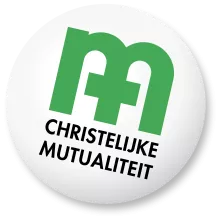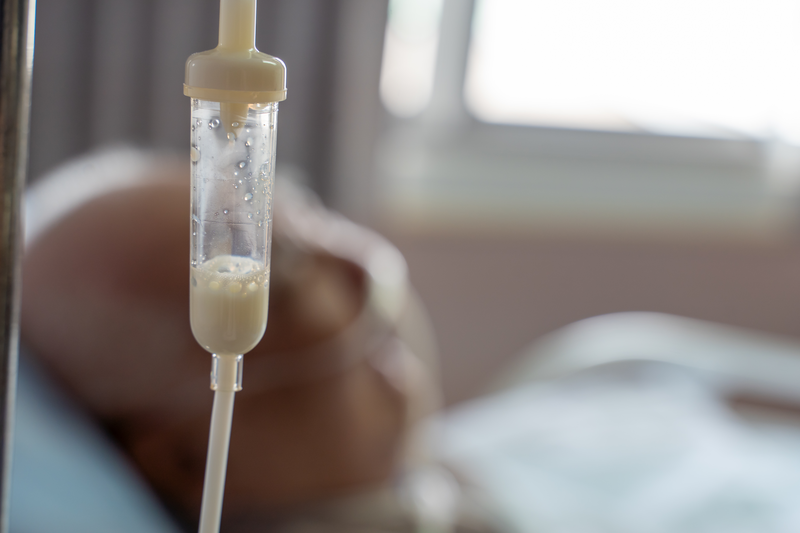Enteral nutrition
Enteral nutrition can be partially reimbursed by health insurance in certain cases.

Those who are unable to feed themselves by mouth are often given liquid food through a tube. Tube feeding is also sometimes used in people with disturbed intestinal function. The tube may be connected to the stomach via the nose (nasogastric).
If nutrition must be administered for a long time, it is often more comfortable for the patient to create a gastric stoma (percutaneous endoscopic gastrostomy or PEG), linked to a tube connected to the small intestine.
The liquid food can flow through the probe under the influence of gravity or be propelled by a pump .
The choice of food administered should take into account the specific nutritional needs of the patient. And this concerns both the quantity (volume, number of calories, proteins, etc.) and the qualitative composition of the nutrients.
Distinguish between polymeric and semi-elemental preparations
- Polymeric preparations are close to our traditional diet , but in a liquid form that allows administration through a tube. This food still requires a functional intestine for digestion and absorption.
- Semi-elemental preparations consist of a number of nutrients that are close to the elementary building blocks of our diet. They place few demands on the intestine in terms of digestion and absorption. In addition, the composition can respond to a disease state of the intestine (e.g. problems of inflammation, intolerance to certain molecules, specific enzymatic insufficiency).
Refund conditions
The health insurance provides reimbursement for enteral nutrition for patients with one of the pathologies below.
- severe neurological pathologies with absence or incoordination of the swallowing reflex;
- sequelae of buccopharyngeal or laryngeal surgery and/or radiotherapy;
- obstruction of the oropharynx, esophagus or stomach;
- hereditary metabolic diseases.
Patients with a serious absorption disorder in the intestines, for which parenteral nutrition is or was necessary, due to:
- idiopathic inflammatory bowel diseases (Crohn's disease, ulcerative colitis) that:
- are drug resistant;
- and have affected the extensive segments of the intestine;
- extensive intestinal resections;
- severe malabsorption in the intestines due to:
- radioenteritis;
- total villous atrophy;
- intestinal lymphomas;
- chronic recurrent pancreatitis;
- cystic fibrosis;
- surinfection of the digestive tract in patients suffering from acquired immunodeficiency syndrome;
- persistent diarrhea in children, congenital or acquired;
- resistant chylous ascites.
Children and adolescents under the age of 18 with a serious condition that results in malnutrition - which affects the development of height and body weight.
Patients suffering from a severe functional disorder of the gastrointestinal system with documented significant impact on nutritional status, where it was impossible to correct nutritional status in an acceptable manner by oral route (via nasoduodenal tube or percutaneous jejunal tube). A detailed report with the history of the treatments must be drawn up by the specialist doctor and added to the application.
Patients suffering from a serious illness leading to severe malnutrition (either NRS Nutritional Risk Screening score greater than 3 or BMI less than 18.5) and not achieving recommended nutritional goals in the form of oral nutrition or oral nutritional supplements.
For this indication, enteral feeding should be initiated during hospital admission or during the three months following a hospital stay, as prescribed by a physician responsible for treatment during the hospital stay.
The Royal Decree of 10 November 1996 emphasizes the quality of the indication by referring to a team within the hospital that has extensive experience with tube feeding.
Amount
Multiple amounts can be combined per day.
- Depending on the type of food, one of the amounts below
- Use of a polymer product: 4.20 euros per day.
- Use of a semi-elementary product: 15.38 euros per day.
- Depending on the method of administration
- Without pump: material: 0.73 euros per day.
- With pump: material: 1.18 euros per day + use of the pump: 0.42 euros per day.
The patient must submit proof of payment corresponding to the preparations and means of administration to CM. The reimbursement can never exceed the amounts so accounted for.
Extra information
In addition to the Royal Decree of November 10, 1996, additional reimbursements are possible.
- If a stoma has been placed, the material (gastric button, probe) will be reimbursed via the nomenclature of implants.
- Persons under the age of 19 benefit from an additional arrangement via the maximum invoice.
Art. 37sexies: "... The costs borne by the beneficiary, who has not reached the age of 19, with regard to enteral nutrition at home via tube or stoma are also considered to be a personal share."
Procedure
The insurance reimbursement is determined by:
- the type of nutritional preparation;
- the method of administration : with or without pump.
The reimbursement is subject to the approval of the consulting physician . This agreement is valid for twelve months and can be extended for one year.
The treating medical specialist or general practitioner , in consultation with the specialist, can submit an application. This is done using a standard form that justifies the need for tube feeding.

